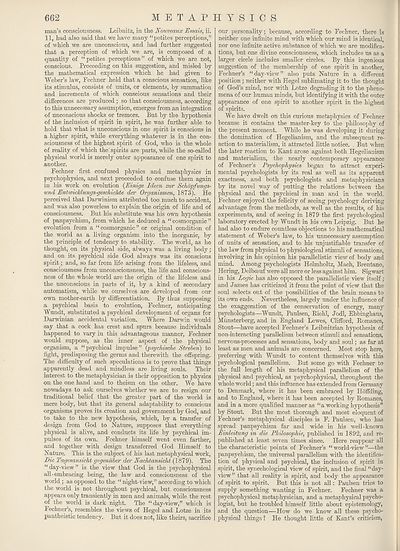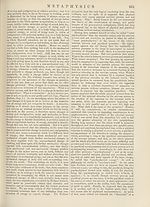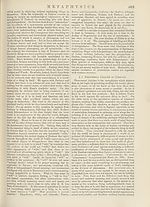New volumes of the Encyclopædia Britannica > Volume 30, K-MOR
(706) Page 662
Download files
Complete book:
Individual page:
Thumbnail gallery: Grid view | List view

662
METAPHYSICS
man’s consciousness. Leibnitz, in the Nouveaux Essais, ii.
11, had also said that we have many “petites perceptions,”
of which we are unconscious, and had further suggested
that a perception of which we are, is composed of a
quantity of “ petites perceptions ” of which we are not,
conscious. Proceeding on this suggestion, and misled by
the mathematical expression which he had given to
Weber’s law, Fechner held that a conscious sensation, like
its stimulus, consists of units, or elements, by summation
and increments of which conscious sensations and their
differences are produced; so that consciousness, according
to this unnecessary assumption, emerges from an integration
of unconscious shocks or tremors. But by the hypothesis
of the inclusion of spirit in spirit, he was further able to
hold that what is unconscious in one spirit is conscious in
a higher spirit, while everything whatever is in the con¬
sciousness of the highest spirit of God, who is the whole
of reality of which the' spirits are parts, while the so-called
physical world is merely outer appearance of one spirit to
another.
Fechner first confused physics and metaphysics in
psychophysics, and next proceeded to confuse them again
in his work on evolution (Einige Ideen zur Schopfungs-
und EntwicMungs-geschichte der Organismen, 1873). He
perceived that Darwinism attributed too much to accident,
and was also powerless to explain the origin of life and of
consciousness. But his substitute was his own hypothesis
of panpsychism, from which he deduced a “ cosmorganic ”
evolution from a “ cosmorganic ” or original condition of
the world as a living organism into the inorganic, by
the principle of tendency to stability. The world, as he
thought, on its physical side, always was a living body;
and on its psychical side God always was its conscious
spirit; and, so far from life arising from the lifeless, and
consciousness from unconsciousness, the life and conscious¬
ness of the whole world are the origin of the lifeless and
the unconscious in parts of it, by a kind of secondary
automatism, while we ourselves are developed from our
own mother-earth by differentiation. By thus supposing
a psychical basis to evolution, Fechner, anticipating
Wundt, substituted a psychical development of organs for
Darwinian accidental variation. Where Darwin would
say that a cock has crest and spurs because individuals
happened to vary in this advantageous manner, Fechner
would suppose, as the inner aspect of the physical
organism, a “psychical impulse” (psychische Streben) to
fight, predisposing the germs and therewith the offspring.
The difficulty of such speculations is to prove that things
apparently dead and mindless are living souls. Their
interest to the metaphysician is their opposition to physics
on the one hand and to theism on the other. We have
nowadays to ask ourselves whether we are to resign our
traditional belief that the greater part of the world is
mere body, but that its general adaptability to conscious
organisms proves its creation and government by God, and
to take to the new hypothesis, which, by a transfer of
design from God to Nature, supposes that everything
physical is alive, and conducts its life by psychical im¬
pulses of its own. Fechner himself went even farther,
and together with design transferred God Himself to
Nature. This is the subject of his last metaphysical work,
Die Tagesansicht gegeniiber der Nachtansicht (1879). The
“ day-view ” is the view that God is the psychophysical
all-embracing being, the law and consciousness of the
world ; as opposed to the “ night-view,” according to which
the world is not throughout psychical, but consciousness
appears only transiently in men and animals, while the rest
of the world is dark night. The “ day-view,” which is
I echner’s, resembles the views of Hegel and Lotze in its
pantheistic tendency. But it does not, like theirs, sacrifice
our personality; because, according to Fechner, there is
neither one infinite mind Avith which our mind is identical,
nor one infinite active substance of which we are modifica¬
tions, but one divine consciousness, which includes us as a
larger circle includes smaller circles. By this ingenious
suggestion of the membership of one spirit in another,
Fechner’s “day-view” also puts Nature in a different
position; neither with Hegel sublimating it to the thought
of God’s mind, nor with Lotze degrading it to the pheno¬
mena of our human minds, but identifying it with the outer
appearance of one spirit to another spirit in the highest
of spirits.
We have dwelt on this curious metaphysics of Fechner
because it contains the master-key to the philosophy of
the present moment. While he was developing it during
the domination of Hegelianism, and the subsequent re¬
action to materialism, it attracted little notice. . But when
the later reaction to Kant arose against both Hegelianism
and materialism, the nearly contemporary appearance
of Fechner’s Psychophysics began to attract experi¬
mental psychologists by its real as well as its apparent
exactness, and both psychologists and metaphysicians
by its novel way of putting the relations between the
physical and the psychical in man and in the world.
Fechner enjoyed the felicity of seeing psychology deriving
advantage from the methods, as well as the results, of his
experiments, and of seeing in 1879 the first psychological
laboratory erected by Wundt in his own Leipzig. But he
had also to endure countless objections to his mathematical
statement of Weber’s law, to his unnecessary assumption
of units of sensation, and to his unjustifiable transfer of
the law from physical to physiological stimuli of sensations,
involving in his opinion his parallelistic view of body and
mind. Among psychologists Helmholtz, Mach, Brentano,
Hering, Delboeuf were all more or less against him. Sigwart
in his Logic has also opposed the parallelistic view itself;
and James has criticized it from the point of view that the
soul selects out of the possibilities of the brain means to
its own ends. Nevertheless, largely under the influence of
the exaggeration of the conservation of energy, many
psychologists—Wundt, Paulsen, Riehl, Jodi, Ebbinghaus,
Miinsterberg, and in England Lewes, Clifford, Romanes,
Stout—have accepted Fechner’s Leibnitzian hypothesis of
non-interacting parallelism between stimuli and sensations,
nervous-processes and sensations, body and soul; as far at
least as men and animals are concerned. Most stop here,
preferring with Wundt to content themselves with this
psychological parallelism. But some go with Fechner to
the full length of his metaphysical parallelism of the
physical and psychical, as psychophysical, throughout the
whole world; and this influence has extended from Germany
to Denmark, where it has been embraced by Hoffding,
and to England, where it has been accepted by Romanes,
and in a more qualified manner as “a working hypothesis”
by Stout. But the most thorough and most eloquent of
Fechner’s metaphysical disciples is F. Paulsen, who has
spread panpsychism far and wide in his well-known
Einleitung in die Philosophic, published in 1892, and re¬
published at least seven times since. Here reappear all
the characteristic points of Fechner’s “world-view”—the
panpsychism, the universal parallelism with the identifica¬
tion of physical and psychical, the inclusion of spirit in
spirit, the synechological view of spirit, and the final “day-
view” that all reality is spirit, and body the appearance
of spirit to spirit. But this is not all: Paulsen tries to
supply something wanting in Fechner. Fechner was a
psychophysical metaphysician, and a metaphysical psycho¬
logist, but he troubled himself little about epistemology,
and the question—How do we know all these psycho¬
physical things? He thought little of Kant’s criticism,
METAPHYSICS
man’s consciousness. Leibnitz, in the Nouveaux Essais, ii.
11, had also said that we have many “petites perceptions,”
of which we are unconscious, and had further suggested
that a perception of which we are, is composed of a
quantity of “ petites perceptions ” of which we are not,
conscious. Proceeding on this suggestion, and misled by
the mathematical expression which he had given to
Weber’s law, Fechner held that a conscious sensation, like
its stimulus, consists of units, or elements, by summation
and increments of which conscious sensations and their
differences are produced; so that consciousness, according
to this unnecessary assumption, emerges from an integration
of unconscious shocks or tremors. But by the hypothesis
of the inclusion of spirit in spirit, he was further able to
hold that what is unconscious in one spirit is conscious in
a higher spirit, while everything whatever is in the con¬
sciousness of the highest spirit of God, who is the whole
of reality of which the' spirits are parts, while the so-called
physical world is merely outer appearance of one spirit to
another.
Fechner first confused physics and metaphysics in
psychophysics, and next proceeded to confuse them again
in his work on evolution (Einige Ideen zur Schopfungs-
und EntwicMungs-geschichte der Organismen, 1873). He
perceived that Darwinism attributed too much to accident,
and was also powerless to explain the origin of life and of
consciousness. But his substitute was his own hypothesis
of panpsychism, from which he deduced a “ cosmorganic ”
evolution from a “ cosmorganic ” or original condition of
the world as a living organism into the inorganic, by
the principle of tendency to stability. The world, as he
thought, on its physical side, always was a living body;
and on its psychical side God always was its conscious
spirit; and, so far from life arising from the lifeless, and
consciousness from unconsciousness, the life and conscious¬
ness of the whole world are the origin of the lifeless and
the unconscious in parts of it, by a kind of secondary
automatism, while we ourselves are developed from our
own mother-earth by differentiation. By thus supposing
a psychical basis to evolution, Fechner, anticipating
Wundt, substituted a psychical development of organs for
Darwinian accidental variation. Where Darwin would
say that a cock has crest and spurs because individuals
happened to vary in this advantageous manner, Fechner
would suppose, as the inner aspect of the physical
organism, a “psychical impulse” (psychische Streben) to
fight, predisposing the germs and therewith the offspring.
The difficulty of such speculations is to prove that things
apparently dead and mindless are living souls. Their
interest to the metaphysician is their opposition to physics
on the one hand and to theism on the other. We have
nowadays to ask ourselves whether we are to resign our
traditional belief that the greater part of the world is
mere body, but that its general adaptability to conscious
organisms proves its creation and government by God, and
to take to the new hypothesis, which, by a transfer of
design from God to Nature, supposes that everything
physical is alive, and conducts its life by psychical im¬
pulses of its own. Fechner himself went even farther,
and together with design transferred God Himself to
Nature. This is the subject of his last metaphysical work,
Die Tagesansicht gegeniiber der Nachtansicht (1879). The
“ day-view ” is the view that God is the psychophysical
all-embracing being, the law and consciousness of the
world ; as opposed to the “ night-view,” according to which
the world is not throughout psychical, but consciousness
appears only transiently in men and animals, while the rest
of the world is dark night. The “ day-view,” which is
I echner’s, resembles the views of Hegel and Lotze in its
pantheistic tendency. But it does not, like theirs, sacrifice
our personality; because, according to Fechner, there is
neither one infinite mind Avith which our mind is identical,
nor one infinite active substance of which we are modifica¬
tions, but one divine consciousness, which includes us as a
larger circle includes smaller circles. By this ingenious
suggestion of the membership of one spirit in another,
Fechner’s “day-view” also puts Nature in a different
position; neither with Hegel sublimating it to the thought
of God’s mind, nor with Lotze degrading it to the pheno¬
mena of our human minds, but identifying it with the outer
appearance of one spirit to another spirit in the highest
of spirits.
We have dwelt on this curious metaphysics of Fechner
because it contains the master-key to the philosophy of
the present moment. While he was developing it during
the domination of Hegelianism, and the subsequent re¬
action to materialism, it attracted little notice. . But when
the later reaction to Kant arose against both Hegelianism
and materialism, the nearly contemporary appearance
of Fechner’s Psychophysics began to attract experi¬
mental psychologists by its real as well as its apparent
exactness, and both psychologists and metaphysicians
by its novel way of putting the relations between the
physical and the psychical in man and in the world.
Fechner enjoyed the felicity of seeing psychology deriving
advantage from the methods, as well as the results, of his
experiments, and of seeing in 1879 the first psychological
laboratory erected by Wundt in his own Leipzig. But he
had also to endure countless objections to his mathematical
statement of Weber’s law, to his unnecessary assumption
of units of sensation, and to his unjustifiable transfer of
the law from physical to physiological stimuli of sensations,
involving in his opinion his parallelistic view of body and
mind. Among psychologists Helmholtz, Mach, Brentano,
Hering, Delboeuf were all more or less against him. Sigwart
in his Logic has also opposed the parallelistic view itself;
and James has criticized it from the point of view that the
soul selects out of the possibilities of the brain means to
its own ends. Nevertheless, largely under the influence of
the exaggeration of the conservation of energy, many
psychologists—Wundt, Paulsen, Riehl, Jodi, Ebbinghaus,
Miinsterberg, and in England Lewes, Clifford, Romanes,
Stout—have accepted Fechner’s Leibnitzian hypothesis of
non-interacting parallelism between stimuli and sensations,
nervous-processes and sensations, body and soul; as far at
least as men and animals are concerned. Most stop here,
preferring with Wundt to content themselves with this
psychological parallelism. But some go with Fechner to
the full length of his metaphysical parallelism of the
physical and psychical, as psychophysical, throughout the
whole world; and this influence has extended from Germany
to Denmark, where it has been embraced by Hoffding,
and to England, where it has been accepted by Romanes,
and in a more qualified manner as “a working hypothesis”
by Stout. But the most thorough and most eloquent of
Fechner’s metaphysical disciples is F. Paulsen, who has
spread panpsychism far and wide in his well-known
Einleitung in die Philosophic, published in 1892, and re¬
published at least seven times since. Here reappear all
the characteristic points of Fechner’s “world-view”—the
panpsychism, the universal parallelism with the identifica¬
tion of physical and psychical, the inclusion of spirit in
spirit, the synechological view of spirit, and the final “day-
view” that all reality is spirit, and body the appearance
of spirit to spirit. But this is not all: Paulsen tries to
supply something wanting in Fechner. Fechner was a
psychophysical metaphysician, and a metaphysical psycho¬
logist, but he troubled himself little about epistemology,
and the question—How do we know all these psycho¬
physical things? He thought little of Kant’s criticism,
Set display mode to:
![]() Universal Viewer |
Universal Viewer | ![]() Mirador |
Large image | Transcription
Mirador |
Large image | Transcription
Images and transcriptions on this page, including medium image downloads, may be used under the Creative Commons Attribution 4.0 International Licence unless otherwise stated. ![]()
| Encyclopaedia Britannica > New volumes of the Encyclopædia Britannica > Volume 30, K-MOR > (706) Page 662 |
|---|
| Permanent URL | https://digital.nls.uk/193576679 |
|---|
| Attribution and copyright: |
|
|---|---|
| Shelfmark | EB.18 |
|---|---|
| Description | Ten editions of 'Encyclopaedia Britannica', issued from 1768-1903, in 231 volumes. Originally issued in 100 weekly parts (3 volumes) between 1768 and 1771 by publishers: Colin Macfarquhar and Andrew Bell (Edinburgh); editor: William Smellie: engraver: Andrew Bell. Expanded editions in the 19th century featured more volumes and contributions from leading experts in their fields. Managed and published in Edinburgh up to the 9th edition (25 volumes, from 1875-1889); the 10th edition (1902-1903) re-issued the 9th edition, with 11 supplementary volumes. |
|---|---|
| Additional NLS resources: |
|

